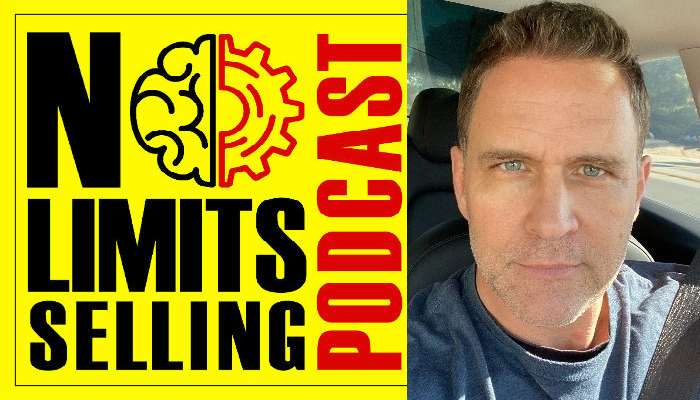How Can “The Sales Whisperer®” Quadruple Your Sales
On Episode 157 of The No Limits Selling Podcast, we have Wes Schaeffer, Chief Revenue Officer at The Sales Whisperer®.
You can tell good stories to create memorable marketing that accelerates sales enablement in any industry, any economy, at any time to sell more, faster, at a higher margin, with ease.
Get a free copy of how to establish a mutually agreed upon sales agenda at TheSalesAgenda.com
DID YOU KNOW?
Only 7% of companies respond to leads within five minutes while 55% take 5+ days or do not even bother to respond to leads at all. I provide the tools, skills & automation to help you close more sales faster & overcome objections. HOW I SERVE SALES PROFESSIONALS:
- Keynote Speeches
- Make Every Sale Success System
- 90-Day Coaching Program
- Inner Circle Membership
- Books & Tools
UNIQUE EXPERIENCE
- I am a ruthlessly pragmatic sales trainer, marketing consultant, keynote speaker, copywriter, & CRM automation expert
- Air Force Vet, Husband, Father of 7
- My sole focus is helping professional salespeople, sales managers, business owners & entrepreneurs find the exact tools and programs they need to grow.
CLIENT RESULTS:
- “Our due diligence retainers increased over $50,000 per month…Every hour spent under Wes’s tutelage was worth every single penny.”~Zach Smith, CEO, Funded Today
- Greg & Julie Alexander converted 74% of the room after one session with Wes
- Tabitha Day Philen hosted a Facebook Live three days before her webinar. She answered their hidden objections & raised her prices by 423%.
- Visit https://www.thesaleswhisperer.com/fans
SPECIALTIES: HubSpot CRM ★ Sales Enablement ★ Infusionsoft ★ Lead Generation ★ Sales Training ★ Ontraport ★ Email Marketing Systems ★ Salesforce CRM ★ Internet Marketing ★ Copywriting ★ Zoho CRM ★ Sales Force Automation

Contact Wes:
[EDITOR’S NOTE: This podcast is sponsored by No Limits Selling. It is a fun, fast-paced podcast that delivers hard-fought business advice that you can implement today to improve your sales and performance]
Interested In Our Real Estate Coaching Services? Explore Our Website: Link
Feeling Not Well Today? You Can Use Our Mindset Boosters App To amp Up Your Mood: Link
Find us on Social Media:
LinkedIn | Facebook community | Instagram
Like what do you listen to? Subscribe to our podcast!
Ready to become fearless? We can help you become fearless in 60 days so you accomplish more in your career Schedule A 15 min Call with Umar
Summary
Introduction and Background of Wes Schaeffer
The podcast begins with an introduction of Wes Schaeffer, also known as The Sales Whisperer. Wes shares his background, detailing his journey from his time in the Air Force to his career in sales. He talks about the various roles he held in different companies, and how these experiences shaped his approach to sales and led him to become The Sales Whisperer. He emphasizes the importance of continuous learning and adapting in the field of sales.
Mindset in Sales
Wes delves into the topic of mindset and its critical role in sales. He believes that having the right mindset is key to overcoming challenges and achieving success in sales. He discusses how salespeople often face rejection and need to have the resilience and positive mindset to keep going. He also highlights that a salesperson's mindset can greatly influence their interactions with customers and their sales outcomes.
Role of Technology in Sales
The conversation shifts to the role of technology in sales. Wes acknowledges that technology can be a powerful tool in sales, helping to streamline processes and provide valuable customer insights. However, he warns against relying too heavily on technology, stating that it should not replace the human element in sales. He emphasizes the importance of personal connection and understanding the customer on a human level.
Strategies for Successful Selling
Wes shares some of his strategies for successful selling. He stresses the importance of listening to customers and understanding their needs. He believes that salespeople should focus on providing solutions to customers' problems rather than just selling products. He also talks about the importance of follow-up and maintaining relationships with customers.
Conclusion
In this insightful podcast, Wes Schaeffer, known as The Sales Whisperer, shares his journey from the Air Force to becoming a sales expert. He emphasizes the importance of mindset in sales, stating that resilience and positivity are key to overcoming challenges and achieving success. While acknowledging the benefits of technology in sales, he cautions against over-reliance on it, advocating for the irreplaceable human element in sales.
He shares his sales strategies, highlighting the importance of understanding customer's needs, providing solutions, and maintaining relationships. In his concluding remarks, Wes encourages salespeople to stay motivated, continuously learn, and focus on building strong relationships with customers, reiterating the significance of a positive mindset in the realm of sales.
Questions & Answers
Who is Wes Schaeffer, The Sales Whisperer?
What is the importance of mindset in sales according to Wes Schaeffer?
How does Wes Schaeffer view the role of technology in sales?
What are some of Wes Schaeffer's strategies for successful selling?
What advice does Wes Schaeffer give to salespeople?
Don’t miss this opportunity to transform your real estate career with one-on-one coaching. As an experienced real estate coach, I, Umar Hameed, am dedicated to helping you unlock your full potential and achieve your real estate goals. To learn more about who am I and my clients ↓
If you’re ready to take the next step, book an appointment with me today and begin your journey toward success in the real estate industry.
